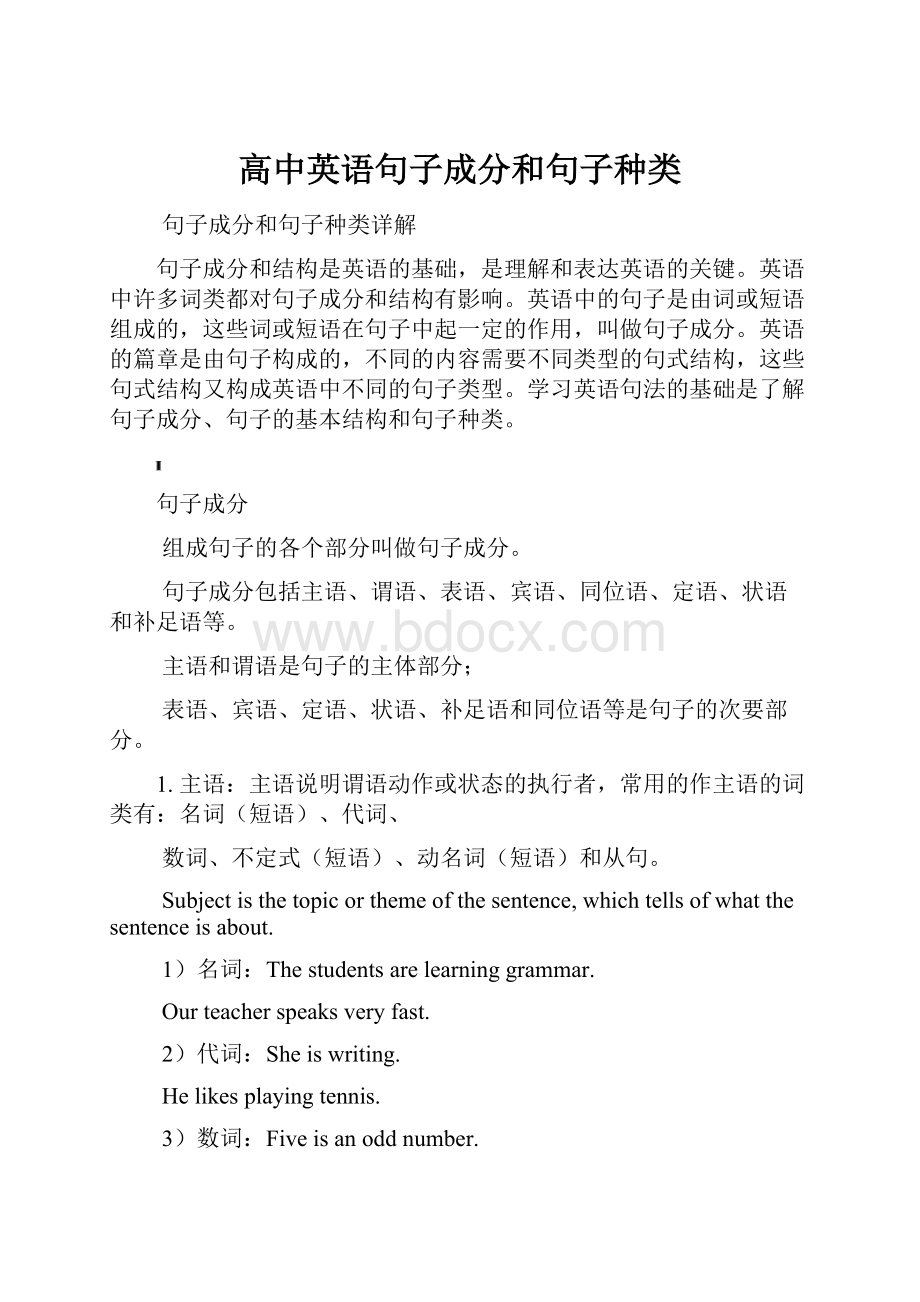高中英语句子成分和句子种类.docx
《高中英语句子成分和句子种类.docx》由会员分享,可在线阅读,更多相关《高中英语句子成分和句子种类.docx(26页珍藏版)》请在冰豆网上搜索。

高中英语句子成分和句子种类
句子成分和句子种类详解
句子成分和结构是英语的基础,是理解和表达英语的关键。
英语中许多词类都对句子成分和结构有影响。
英语中的句子是由词或短语组成的,这些词或短语在句子中起一定的作用,叫做句子成分。
英语的篇章是由句子构成的,不同的内容需要不同类型的句式结构,这些句式结构又构成英语中不同的句子类型。
学习英语句法的基础是了解句子成分、句子的基本结构和句子种类。
句子成分
组成句子的各个部分叫做句子成分。
句子成分包括主语、谓语、表语、宾语、同位语、定语、状语和补足语等。
主语和谓语是句子的主体部分;
表语、宾语、定语、状语、补足语和同位语等是句子的次要部分。
1.主语:
主语说明谓语动作或状态的执行者,常用的作主语的词类有:
名词(短语)、代词、
数词、不定式(短语)、动名词(短语)和从句。
Subjectisthetopicorthemeofthesentence,whichtellsofwhatthesentenceisabout.
1)名词:
Thestudentsarelearninggrammar.
Ourteacherspeaksveryfast.
2)代词:
Sheiswriting.
Helikesplayingtennis.
3)数词:
Fiveisanoddnumber.
Sixismyfavouritenumber.
4)不定式:
TolearnEnglishwellisimportant.
Itisnoteasytorememberallrules.
5)动名词:
Swimmingisinteresting.
Learninggrammarwellisdifficult.
6)主语从句:
WhatIsaidistrue.
Whatwecan'tgetseemsbetterthanwhatwehave.
2.谓语:
谓语用来描述主语的行为动作或所处的状态。
谓语的中心词是限定动词,有人称、
数和时态的变化。
Predicatesayssomethingaboutthesubjectandbearsthenewinformationwhich
thespeakerorwriterwantstotransmittothelistenerorreader.
1)简单谓语
动词:
Heboughtadictionaryyesterday.
动词短语:
Heislookingforhispen.
2)复合谓语
系动词+表语:
Wearestudents.
情态动词+不定式:
Imaybewrong.
动词+不定式:
Wehavetodosomethingforthem.
3.表语:
表语与前面的系动词一起构成复合谓语,用来说明主语的特征、类属、状态、身
份等。
充作表语的可以是单词、短语或从句。
Predicativeexpressesthestatus,characteristicsorthequalityofthesubject.
1)名词:
Heisadoctor.
Mr.Scottisafarmer.
2)代词:
Itisme.
That'ssomethingwehavealwaystokeepinmind.
3)数词:
Myluckynumberisnine.
Shewasthefirsttolearnaboutit.
4)形容词:
Theclassroomisbig.
Hishairhasgonewhite.
5)副词:
Iamhere.
6)介词:
Weareintheclassroom.
7)动名词:
Myjobisteachingthemgrammar.
=Teachingthemgrammarismyjob.
8)分词:
Thefilmisexciting.
Timeispressing.Let'shurryup.
9)不定式短语:
Myjobistoteachthemgrammar.
AllIcandoistosendheratelegram.
10)表语从句:
Helooksasifheweregoingtocry.
Thesuggestionisthatweshouldrecitemorewords.
注意:
名词:
身份、性质、内容。
形容词:
特点、特征。
4.宾语:
宾语为动作的承受者。
Objectrepresentsthepersonorthethingthatsomethingisdonetoortheperson
whoisconcernedintheresultofanaction.
1)名词:
Heisdrinkingwater.
I'veboughtanEnglish-Chinesedictionary.
2)代词:
Theteacheristalkingtoher.
Theydidn'tpromisehimanything.
3)数词:
Ilikesix.
Iwantthefirst.
4)动名词:
HelikeswatchingTV.
Ienjoyedworkingwithyou.
5)不定式:
Iwanttobuyabook.
Myfatherlikestoswiminwinter.
6)宾语从句:
Heaskedifhemightgothere.
Didyouwritedownwhatshesaid?
注意:
英语有单宾语、双宾语、复合宾语、同源宾语等。
1)单宾语:
Icanhardlyheartheradio.Wouldyoupleaseturnitup?
Pleasestopmakingnoise.
DoyouunderstandwhatImean?
2)双宾语:
双宾语指动词后面接指人和指物的两个宾语。
(指人的宾语叫间接宾语;指物的宾语叫直接宾语)
其结构为:
主语+及物动词(短语)+sb.+sth.
Pleasetellmehowtheaccidentcameabout.
(me为间接宾语,how从句为直接宾语)
Theteacheraskedmeaquestion.
(me为间接宾语,aquestion为直接宾语)
当直接宾语与间接宾语位置调换时,须在间接宾语前加介词
to/for等。
Wouldyouliketodomeafavor?
=Wouldyouliketodoafavorforme?
3)复合宾语:
“宾语+宾语补足语”构成了复合宾语,宾语与补足语之间具有
逻辑上的主谓关系。
Weallfindhimaniceboy.
(him为宾语,aniceboy为宾语补足语)
Isawastrangerwavingtome.
(astranger为宾语,wavingtome为宾语补足语)
4)同源宾语:
同源宾语指由名词担任的能重复动词部分或全部意思的直接宾
语,前面常有修饰语。
laughagoodlaugh大笑smileagentlesmile微微一笑
liveahappylife过着幸福生活dieagloriousdeath死得光荣
dreamabeautifuldream作美梦singasweetsong唱了一首甜
美的歌blowaheavyblow沉重地一击
5.同位语:
对句子中某一成分作进一步解释、说明,与前面的词在语法上处于同等地位的
句子成分叫做同位语。
同位语常常置于被说明的词之后。
Appositiveisthefurtherinformationafteranounorapronounreferringto
"who"or"what".
1)名词:
ZhangSir,ourgrammarteacherishumorous.
ThisisMr.Zhou,directorofourhospital.
2)代词:
Hehimselfdidit.
3)数词:
Theyear,1988isimportant.
Wetwowillgoshoppingthisafternoon.
4)动名词:
Mytask,lookingafterthesechildrenisimportant.
5)不定式:
Myjob,toteachthemgrammarishard.
6)同位语从句:
Ihadnoideathatyouwerehere.
Thesuggestionthatweshouldrecitemorewordsisuseful.
6.定语:
定语是用来描述名词或代词的修饰语,它常和名词构成名词短语。
Attributiveisusedtomodifyanounorapronoun.
前置定语:
1)名词:
IwantanEnglish-Chinesedictionary.
Hehasboughtagrammarbook.
2)代词:
Thisismybag.
Nodifficultywhatevercanstopouradvance.
3)数词:
Therearetwopolicemaninthestreet.
Pleasereadthefirstparagraph.
4)冠词:
Thisisadesk.
5)形容词:
Ilikeredapples.
Hegavemeavividdescriptionofthebattle.
6)动名词:
Thisisasleepingcar.
Theswimmingpooliswonderful.
后置定语:
7)副词:
Thestudentsherearegood.
Thebuildingsaroundareofmodernconstruction.
8)介词:
Thestudentsintheclassroomaregood.
Thebookonthedeskismine.
9)不定式:
Ihaveanappletoeat.
Ihavealotofhomeworktodo.
注意:
当句子的主语是不定式动作的发出者时,不定式用主
动形式表被动。
10)定语从句:
Thestudentswhoareintheclassroomaregood.
Theboywhowenttothelibraryisourmonitor.
注意:
是作前置定语还是后置定语取决于自身的长度。
11)分词:
现在分词:
Thisisasleepingboy.
Thesleepingboyismybrother.
Therearesomeboysplayingoutside.
过去分词:
Thisisabrokenglass.
Sheistakingcareofthenewly-bornchild.
Wemustsolvetheproblemsleftbyhistory.
注意:
动名词作定语,表示所修饰名词的性质或用途。
Thisisasleepingcar.
=Thisisacarusedforsleeping.
分词作定语,表示所修饰名词的动作或状态。
Ilikethechildrenplayingontheground.
Thisisaglassbrokenbythatkid.
7.状语:
状语是用来修饰动词、形容词、副词或句子的一种成分。
它可以表示时间、地点、
方式、比较、程度、原因、目的、结果、条件和让步等。
Adverbialisusuallyusedtomodifyaverb,anadjective,anadverborasentence.
英语中有十大状语:
1)时间状语:
HeistoflytoLondontomorrow.
2)地点状语:
ThemeetingwasheldinHarbin.
3)方式状语:
Theworkerstherearepaidbytheweek,notbythemonth.
4)比较状语:
Heworkedasfastasaskilledworker.
5)程度状语:
Heloveshissonverymuch.
6)原因状语:
Becauseofthewarmandsunnyweather,orangesgrowvery
wellhere.
7)目的状语:
Wedoitinthiswaysoastosavetime.
8)结果状语:
Hereturnedhometofindhisfatherdead.
9)条件状语:
Withoutplants,animalscouldnotliveintheworld.
10)让步状语:
Inspiteofallhisefforts,hefailed.
注意:
十大状语,九大状语从句。
程度状语没有状语从句,由程
度副词或现在分词来担任。
1)名词:
HewillgotoJapantomorrow.
2)副词:
LiuXiangrunsfast.
3)形容词:
Hegothome,coldandhungry.
Unabletoanswerthequestion,hesaidnothing.
4)状语从句:
Sincehewasunabletoanswerthequestion,hesaidnothing.
Hegotupearlysothathemightcatchthemorningtrain.
注意:
当状语从句位于主句前面时,必须有“,”
后面时,“,”可有可无
5)介词:
Wearelearninggrammarintheclassroom.
6)不定式:
TheywenttoBeijingtovisitafamouswriter.
Theystudyhardtopasstheexamination.
7)分词:
Seeingthenotice,heranaway.
Seemfromthehill,thevillageisbeautiful.
注意:
分词作状语,其逻辑主语是句子的主语。
Settled,webeganourwork.
→Thequestionsettled,webeganourwork.
8)独立主格:
名词/代词+名词:
Hetalkedaboutfriends,allstars.
形容词:
Hestoodthere,hisfacered.
副词:
Classover,thestudentswentoutofthe
classroom.
介词:
Theteachercamein,abookinhishand.
不定式短语:
Muchworktodo,Idon'tthinkI'll
havetimetocomeandseeyou.
分词:
Someboysmakingsomuchnoise,Icouldn't
study.
Thequestionsettled,webeganourwork.
8.补语:
补语是用来说明宾语或主语的性质、状态等的一种句子成分。
Complementisusedtoformcompletesemanticmeaningofasentence.
补语分为主语补足语和宾语补足语,含有宾语补足语的句子在变为被动句时,
宾语补足语便成了主语补足语。
注意:
补足语力求句意的完整,根据语意,不能随意拿掉。
1)名词:
WecallherZhangSir.
→SheiscalledZhangSirbyus.
形式主语,逻辑上的宾语主动语态的主语变到介词后
注:
被动语态主宾一体。
2)形容词:
Thelettermadehimsad.
→Hewasmadesadbytheletter.
3)介词:
Weconsiderherasourfriend.
→Sheisconsideredasourfriend.
注意:
Asourfriend,sheiskind.
状语可以随意拿掉
4)不定式短语:
(受到动词的制约)
I'llmadehimcomein.主语补足语(bareinfinitive)
→Hewillbemadetocomeinbyme.主语补足语
Theteachermadeusrecitethewords.
→Weweremadetorecitethewords.
5)副词:
I'llmadhimin.
→Hewillbemadein.
I'lllethimout.
→Hewillbeletout.
注意:
虚词不能独立在句子中作成分。
6)分词:
Isawhercrossingthestreet.
→Hewasseencrossingthestreet.
9.独立成分:
与句子没有关系或关系很松,独立于句子之外的成分称为独立成分。
1)感叹词:
感叹词作独立成分多置于句首。
Well,let'sendthediscussion!
There,there!
Nevermind.It'snothingseriousatall.
2)称呼语:
称呼语作独立成分可置于句首、句中或句尾。
Directaddressisusedtoaddresssomebodyintheconversation.
名词:
Hurryup,children!
代词:
You,standup!
Somebody,fetchabasinofwater.
人名:
Tom,comehere.
3)插入语:
Parenthesisisoneormorewordsintroducedasanaddedexplanationor
thought,andinwritingusuallyenclosedatbothendsbyabracketora
comma.
不定式:
Tobefrank,Idon'tquiteagreewithyou.
分词:
Judgingfromyouraccent,youmustbefromScotland.
介词短语:
This,inmyopinion,isonlyoneoftheminorissues.
形容词:
Sureenough,enoughplanescameagainthenextday.
副词:
Honestly,Idon'tneeditatthemoment.
从句:
What'smore,40percentofthefamilieswouldgetanincomeof
over10000yuan.
句子:
Thecross-talk,Ithink,wasbothinterestingandinstructive.
句子种类
英语句子按照使用目的和交际功能分为陈述句、疑问句、祈使句和感叹句。
1.陈述句:
陈述句用来叙述一件事情或表明说话人的看法、态度等,句末用“.”,一般读
作降调。
包括肯定陈述句和否定陈述句。
陈述句的语序一般为“主语部分+谓
语部分”。
1)陈述句的肯定形式:
正常语序:
Hehasansweredmyquestionclearly.
他已经清楚地回答了我的问题。
倒装语序:
Infrontofourvillagerunsaclearriver.
在我们村庄前流淌着一条清澈的小河。
2)陈述句的否定形式:
(1)如果句子的谓语为be动词、助动词或情态动词等,其否定形式是在这
些动词之后加not。
IamnotgoodatChinese.
我汉语不好。
Shecannotplaythepiano.
她不会弹钢琴。
(2)如果句子的谓语是实义动词,在谓语动词前要用don't,doesn't,didn't的
形式。
Theydidn'tknowmyaddressandtelephonenumber.
他们不知道我的地址和电话号码。
Wedon'tgotoschoolonSundays.
我们星期天不上课。
Shedoesn'tlikecoffee.
她不喜欢咖啡。
(3)其他否定词(如no,never,seldom,hardly,nobody等)也可构成否定式。
Nobodyknowshim.
没有人认识他。
IhaveneverbeentoSydney.
我从未去过悉尼。
Sheseldomwriteshome.
她